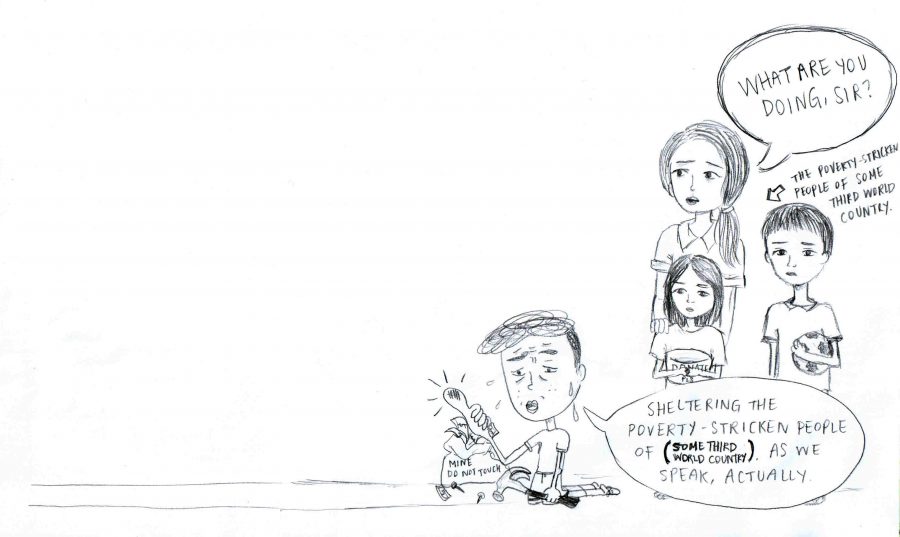When I stumbled upon the activities section of the Common Application, a rush of paranoia hit me. How many extracurricular activities do I take part in? And just how many is the average high school student expected to partake in throughout these four years?
I soon found myself on College Confidential, a forum for kids desperate to get into college, reading lists on lists of different students’ extracurricular activities. As I read, I grew increasingly concerned–and not just because everyone seemed to be much more involved than I am.
At TAS and, increasingly, in other schools around the world, many students think it necessary to not have a life. Some overachievers are juggling seven hours of school each day, captaining the Robotics and three varsity sports teams, helping out at local orphanages, founding student corporations, and interning at research centers on a regular basis. Take, for example, this guy on College Confidential:
Or this one:
Doing that much is cool. That is, if they genuinely want to do all of those things. But it’s not so cool if they’re founding a Beekeeping Club or loitering around in a research lab just so they can add another “activity” onto their applications.
In a highly competitive and academic environment like TAS, motives for service or activities are, more often than not, misguided. As a club president, I’ve had my fair share of friends asking to be given an officer position because they have “nothing on their apps.” I’ve also watched a few people throughout the years found clubs and subsequently do nothing for them. It’s not an unknown fact–we’ve all seen students start clubs or vie for officer positions just to fill up the space on their applications.
The idea of service has been greatly distorted over the years–by schools, parents, and students themselves. Service has become something arbitrary, something requiring a 50-hour commitment for the sake of an IB diploma or a decent-sounding application. And in trying to fill these requirements, we take the most half-hearted attempts to help anybody, slap a few titles onto them, and call them “community service.”
Of course, any kind of service, no matter the quality, is a positive thing. However, people must acknowledge that in such cases, their “service” doesn’t exactly solve all problems.
For example, although I find the intentions of the Cambodia Service Initiative noble, it is far from the best possible way to help out Cambodians. You spend most of the trip learning how to not nail your own hands, and end up building around ten houses that you can’t claim to be quite well-built. In the end, you don’t really do all that much for the Cambodian community at large. In fact, I think it’s safe to say that the participants who go on the trip get far more out of it than those that they are trying to help do.
If anyone claims that going on that trip to hammer nails into mediocre huts can do more good than simply donating to some reliable corporation like the Cambodian Children’s Fund (rated 99.25 out of 100 by Charity Navigator, the “guide to intelligent giving”) to handle a similar construction, I wouldn’t be able to agree.
I do think it’s great that students are getting out there to learn more about the world through service and initiatives. But if you want to make something out of yourself or better the world, don’t resort to empty titles or half-hearted methods like many do nowadays. And if you’re out there in the name of a cause, do your job! Something as simple as making that sale poster when your club president tells you to or sharing a video on Facebook can make a difference in the long run. In short: do things that you mean, and mean the things that you do. If you do that, you’ll be doing the world a lot more service than you think you are doing right now.
While this article does not represent the entire views of our staff, nor the views of TAS at large, our staff and advisor of The Blue and Gold actively encourage and appreciate community dialogue. If you have an opinion on this matter, we would love to receive your thoughts and opinions to be published in upcoming online and/or print editions. Please e-mail us at [email protected]. We look forward to hearing from you!




![A collection of college flags. [PHOTO COURTESY OF AMBER HU ('27)]](https://blueandgoldonline.org/wp-content/uploads/2025/05/IMG_5029-1200x577.jpeg)

![An SAT word cloud. [PHOTO COURTESY OF WORDCLOUDS]](https://blueandgoldonline.org/wp-content/uploads/2025/05/SAT.jpeg)
![Collage of banned books, including “The Handmaid’s Tale” by Margaret Atwood. [MINSUN KIM/ THE BLUE & GOLD]](https://blueandgoldonline.org/wp-content/uploads/2025/04/IMG_4274-1200x681.jpeg)

![A collage of dark romance book covers from an online store for dark romance novels. [PHOTO COURTESY OF TRILOGYOFROMANCE.COM.AU]](https://blueandgoldonline.org/wp-content/uploads/2025/04/IMG_4272-1200x600.png)